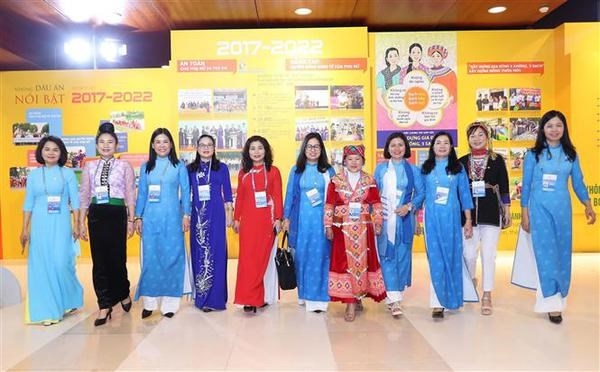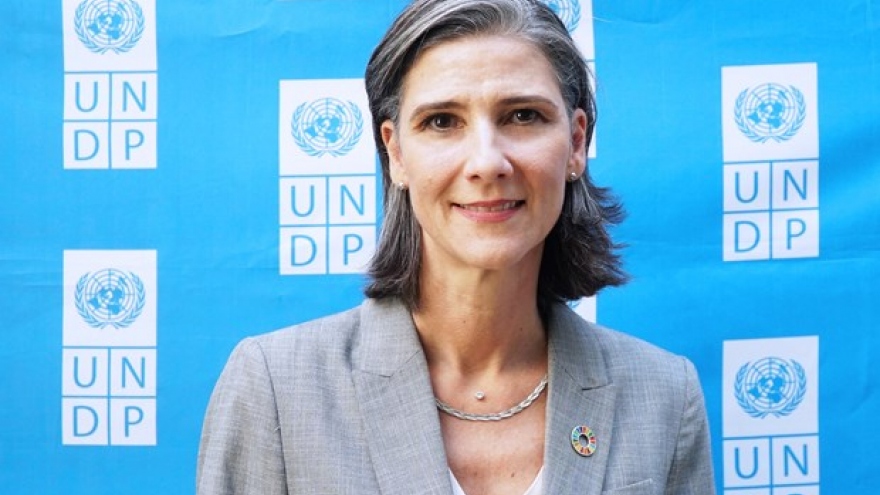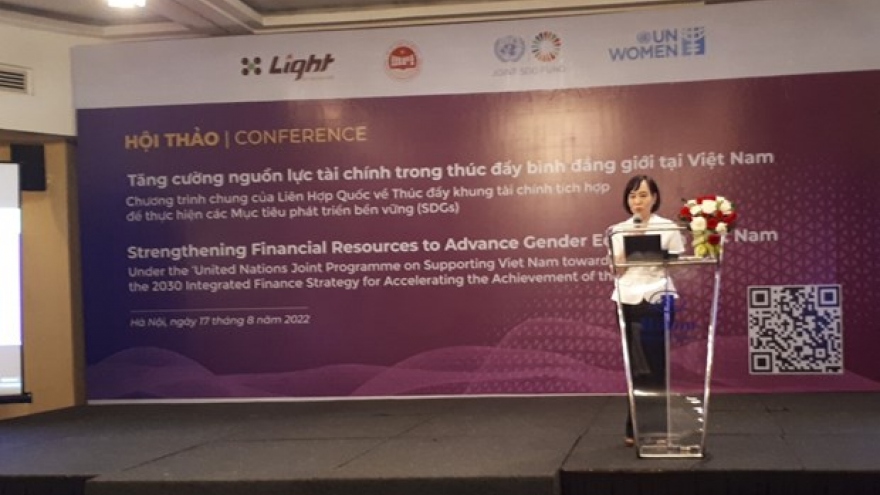Greater efforts needed to further promote gender quality, women empowerment: Experts
Despite the various improvements in the promotion of gender quality and women empowerment, much still remains for Vietnam to do to ease gender prejudice and enhance public awareness on women’s role, according to experts.

Over the years, gender quality and the liberation of women have received great attention of the Party, States, sectors and the entire society, Pham Vu Hoang, vice director of the General Department for Population and Family Planning under the Ministry of Health, said at a recent meeting.
He highlighted that gender equality is a major goal of the Government. On July 29, 1980, Vietnam signed the Convention on the Elimination of All Forms of Discrimination Against Women (CEDAW), which was ratified it by the National Assembly on November 27, 1981. The principle of equality between men and women has been consistently and continuously enshrined in Vietnam's Constitutions, both before and after joining the CEDAW convention, he said.
Hoang noted that on the foundation of the Constitution, many laws in different areas such as politics, economy, labour, education and training, health care, marriage and family as well as criminal law were promulgated, which also consistently promoted gender equality. In addition to the general provisions that apply equally to men and women, there are also policies to adjust the law in accordance with the specific gender characteristics of women and girls.
Particularly, the coming into being of the Law on Gender Equality is the clearest and strongest affirmation of the efforts and continuous progress of Vietnam in perfecting the legal system on equality between men and women, eliminating all forms of gender discrimination against women, and applying practical measures that take into account women’s gender particularities. It is the most vivid demonstration of the determination of the State of Vietnam in ensuring gender equality, Hoang stressed.
Clause 3, Article 5 of the 2006 Law on Gender Equality stipulates that gender equality means that men and women have equal positions and roles and are given conditions and opportunities to promote their capacities for the development of the community and families, and equally enjoy the fruits of that development.
Along with issuing and implementing legal regulations, the Government, ministries, agencies and sectors have released various relevant decrees, circulars and national strategies, while promoting gender equality and women empowerment through the implementation of policies, programmes and projects related to gender equality. Meanwhile, the government has prioritised the increase of the participation by women in the workplace.
As a result, the gender equality index in Vietnam has been continuously improved. In 2020, Vietnam ranked 87th out of the 153 countries surveyed in terms of gender gap narrowing.
Dr. Nguyen Thi Tuyet Minh from the Academy of Journalism and Communications held that the Government of Vietnam has taken many steps towards narrowing the gender gap. In reality, the situation has been improved in several respects but the process remains low, she said. Although the percentage of women engaging in political activities such as holding seats at National Assembly and leadership positions has increased, the gender gap is still quite wide. In terms of leadership positions, men have still overwhelmed.
In ethnic minority-inhabited areas, gender equality and women affairs are still facing many limitations. The proportion of ethnic minority women holding key leadership positions is still modest. In some provinces, female State officials and civil servants account for over 50%, but the proportion of women participating in provincial leadership is still not commensurate with their number in the workforce, while the percentage of women holding key leadership positions at People's Committees at all levels is still low, Minh noted.
She asserted that the gender gap in some occupations and sectors is still very clear. A number of occupations such as construction, science, engineering, technology, and transportation still see an overwhelming percentage of men. In some other professions such as those in humanities and social sciences, the proportion of women is higher.
In the field of labour and employment, research showed that the rate of female workers affected by the COVID-19 pandemic is higher than that of men, while the number of working hours is higher and income falling sharper for women who are shouldering the dual role of family care givers and breadwinners. The rate of domestic violence by gender has also increased during the time of the COVID-19 period, Minh underscored.
She said that in fact, gender inequality leaves heavy consequences for both men, women and LGBTs like those by gender stereotypes, obsession with pivotal roles, and success, thus creating limited confidence for women. When their position in the family and society is still low, women have little opportunity to develop themselves and become independent at work or in economy and career, which weakens their role and voice in the family and society, Minh stated.
According to Hoang, the reality shows that although women's contributions in politics, economy, society, family and community are great, awareness about their role and gender equality is still limited. In many localities across the country, the situation of "men are important and women light" is still lingering. Girls, especially in rural, remote, and ethnic minority-inhabited areas, are in a more disadvantaged position than boys, as well as girls in urban areas in terms of learning opportunities and information access. This is really a big barrier to the empowerment of girls at present and in the future, he said.
Education is a fundamental human right, every child, both girls and boys, has the right to go to school, learn and develop, he stressed. The lack of schooling for girls in mountainous, rural, remote and isolated areas not only reduces their individual potential but also creates a major barrier to their empowerment now and in the future, which also increases cycles of poverty and disadvantage for all generations and for the whole nation. Failing to give children schooling and education access means depriving the country of a potential source of growth, Hoang emphasised.
Pham Thi Hong, a psychologist from the Vietnam Association for the Protection of Children's Rights, held that the idea of "men are important and women light" extremely negatively affects the physical and mental life of women and girls, and worsens gender discrimination.
Hong said that the growing reluctance for marriage in Vietnam may have deep roots from gender inequality. Many women choose to be single mothers not merely because they want to develop their own careers, but they see the pressure born by gender inequality.
Experts held that it is necessary to raise awareness of all classes of people about gender equality, while focusing on promoting gender science education in the school system to help young people and adolescents be aware of gender issues and gender equality in a basic and systematic manner.
In addition, they stressed the need for more policies to promote gender equality, improve the status of women in the society, and gradually eliminating male chauvinism, along with the development and implementation of a system of social security and economic welfare with priority to women and girls, they said.
The experts underlined that to strengthen gender equality, it is crucial to narrow the gender gap in all aspects of life, considering the implementation of gender equality a long-term task that need the coordination of the whole society.


